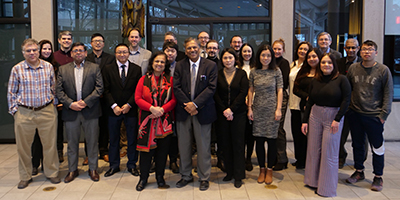Faculty ProjectsNUANCE Cyber-Classroom

Project Manager
Vinayak P. Dravid, Abraham Harris Professor of Materials Science and Engineering; Founding Director, Northwestern University Atomic and Nanoscale Characterization (NUANCE) Center; Founding Director, Soft and Hybrid Nanotechnology Experimental (SHyNE) Resource, an NSF-NNCI Node
Amount Requested
$21,555
Summary
The NUANCE Cyber Classroom 3.0 will be an interactive 3D virtual replica of NUANCE Center’s shared research laboratories. NUANCE houses over 150 nanoscale characterization instruments and cleanroom fabrication tools in over 50 separate research spaces in Cook Hall, Silverman Hall, Hogan Hall, and the Technological Institute. NUANCE Cyber Classroom 3.0 will enable new and prospective students to tour each of the spaces and engage with virtual versions of all available research capabilities. Each of the 150 instruments and tools will live in the interactive virtual laboratories, with virtual training modules for conceptual familiarization ahead of subsequent actual hands-on training. The virtual labs will also host videos and modules providing advanced instructions, detailing equipment capabilities, explaining common applications, and showcasing high-impact research. NUANCE will use the Cyber Classroom 3.0 to primarily impact Northwestern student learning, but we will also engage a broader K-12 audience, introducing them to working University labs and cleanrooms. For reference, one of NUANCE’s R1 peers recently rolled out a similar virtual lab experience.
Watch a video overview of SHyNE Resource & NUANCE.
Planned Activities/Investments
- Purchase Matterport Camera
- Hire a videographer to film NUANCE lab facilities.
- Develop online virtual NUANCE lab site including the development of video content.
- Promote Virtual Lab to target audiences.
- Hold virtual tours for incoming students, potential external audiences, and K-12 students.
- Equipment can be loaned out to other Northwestern facilities and departments.
Impact
The NUANCE Cyber-Classroom will increase engagement with our key community members. Existing, new, and prospective Northwestern students will have a rich learning environment, enhancing subsequent hands-on training and collaboration. K-12 students and educators from across the globe may access the Cyber-Classroom 24/7. In addition, the creation of a 3D accurate virtual model of the research facilities will benefit space planning, design, and resource allocation. Owning the required hardware (Matterport Pro3) will provide flexibility to scan the highly used lab areas. Once the scanning of NUANCE research space is complete, the hardware will be made available to other facilities at Northwestern.
The impact will be evaluated using site analytics and administering surveys to participants following each virtual tour and online demonstration.
Sustainability
NUANCE maintains a modest community engagement budget as part of annual sponsored and discretionary budget. Ongoing hosting, maintenance, and development costs will be supported through normal operations budget.
Deliverables
An interactive 3D virtual research facility environment, accessible online anytime.
Budget Overview
- Camera, Matterport Pro3 Acceleration Kit - $7,995
- Cloud Hosting - $660 (annual)
- Laboratory filming and 3D model development, Rigel Media - $10,000
- Content development, Rigel Media - $12,500
- Requested funds ($21,555)
- Cost share ($10,000)
Total Budget Amount: $31,555
Matching Funds
NUANCE Center will provide a $10,000 match for the development of the initial project through the existing community engagement budget. NUANCE will provide for ongoing maintenance and development through its annual operations budget.
Previous Projects
In 2017, Professor Dravid’s “Cyber Classroom: AC-S/TEM” was funded. This prototype was used to develop seven other similar electron microscopy classrooms (collectively, “Cyber Classroom 2.0”), which were instrumental in NUANCE Center’s response to COVID-19. We hosted all initial electron microscopy training remotely, using the NUANCE Cyber Classroom 2.0. We also host live demonstrations of novel techniques through Cyber Classroom 2.0, which have seen over 1,000 participants from 36 countries.
